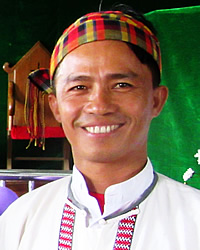Lhaovo in Myanmar (Burma)

Photo Source:
Asia Harvest-Operation Myanmar
|
Send Joshua Project a map of this people group.
|
| People Name: | Lhaovo |
| Country: | Myanmar (Burma) |
| 10/40 Window: | Yes |
| Population: | 145,000 |
| World Population: | 177,000 |
| Primary Language: | Lhao Vo |
| Primary Religion: | Ethnic Religions |
| Christian Adherents: | 23.00 % |
| Evangelicals: | 7.00 % |
| Scripture: | Complete Bible |
| Ministry Resources: | Yes |
| Jesus Film: | Yes |
| Audio Recordings: | Yes |
| People Cluster: | Tibeto-Burman, other |
| Affinity Bloc: | Tibetan-Himalayan Peoples |
| Progress Level: |
|
Identity
They are commonly called “Maru” by outsiders, but the people consider that name pejorative and insist on being called Lhaovo. Although they are considered part of the large Kachin nationality in Myanmar, the Lhaovo “earnestly oppose this classification, insisting on a separate historical and cultural identity.” Across the border in China, the Lhaovo have been counted as part of the official Jingpo minority group. The Lhaovo are culturally related to the Kachin and Jingpo, but in other ways they retain a distinctive identity including their own language.
Location: More than 145,000 Lhaovo people live in north Myanmar's Kachin and Shan states, spread along the China border. An additional 32,000 live inside China, although “Under the British Empire, all Lhaovo lived within the borders of Burma. When the British left in the 1940s and the borders were redrawn, approximately 10 percent of the Lhaovo suddenly found themselves living in southern China.”
Language: Lhaovo, which has three tones and ten dialects, has adopted loanwords from Jingpo, Daai Chin, Burmese, and Chinese. Although the dominant Kachin Jingpo group in the area demand the Lhaovo speak their language for political reasons, the reality is that Lhaovo is a distinct language, and many of their people cannot understand Kachin Jingpo.
History
The Lhaovo claim to have migrated from the Tibetan Plateau thousands of years ago, living first in the Nujiang River Valley in China before settling in northern Myanmar. Some Lhaovo claim they are the original inhabitants of the country, which upsets the Burmese and Kachin Jingpo.
Customs
While acknowledging kinship with the Kachin Jingpo, the Lhaovo “usually marry more freely among the Zaiwa and Lashi to whom they are more deeply related.” Lhaovo communities are close-knit. When a house is built the whole village lends a hand, and when a family moves, they carry fire from their old home by torch, believing the unbroken flame will ensure the continued well-being of the family.
Religion
The 1931 census of Burma returned 17,780 Lhaovo people. Of them, 1,266 were Christians (7.1%) and the rest animists. Although they have had a Christian presence for over a century, nearly eight out of ten Lhaovo people in Myanmar today remain embedded in their animist roots, preferring the worship of spirits and nature over surrender to Christ. Thousands of Lhaovo people claim to be Christians, but one of their church leaders noted: “Many decided to accept Christ for their convenience. They wanted to get rid of the burden of sacrificing offerings of chickens and buffaloes to appease the spirits. They did not really know who Christ is.”
Christianity
Although missionaries first targeted the Lhaovo in the late 1800s and churches were started, true discipleship never ensued, resulting in a nominal faith among many church members. This was exacerbated by the absence of the Scriptures in their own language. The Lhaovo were forced to use Kachin Jingpo Bibles, which are not in their heart language. A revival among the Lhaovo occurred in the 1930s after Rawang evangelists associated with the Assemblies of God took the Gospel to them. It was reported: “The Lisu brought the Gospel to the Rawang, and the Rawang in turn brought it to the Lhaovo. Entire villages turned to Christ and dropped their heathen practices.”6 When the full Lhaovo Bible was finally printed in 2009, it had an immediate impact.7 The translator of the Lhaovo Bible said, “The Kachin Jingpo Christian leadership told us to read their Bible and that there was no need for a Lhaovo translation, but my mother never understood Jingpo. She sat in church every Sunday listening to preaching in Jingpo, but she didn't understand anything. She just wanted to be in the presence of God and with God's people. She died before the Lhaovo Bible was printed. There are at least 50,000 people who speak and read only Lhaovo and no other language. For decades we have desperately needed our own Bible but have felt bullied by the Jingpo to assimilate."